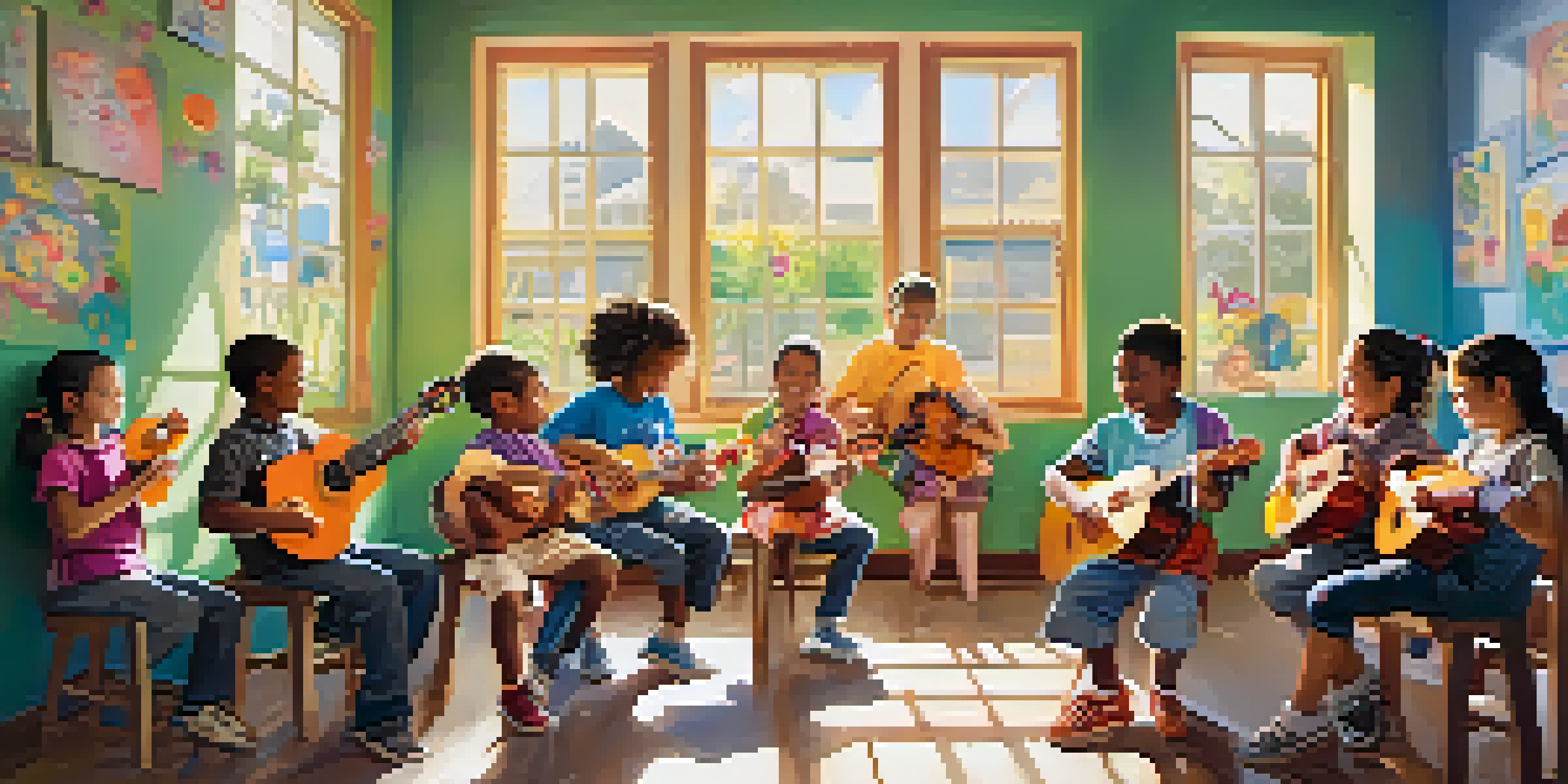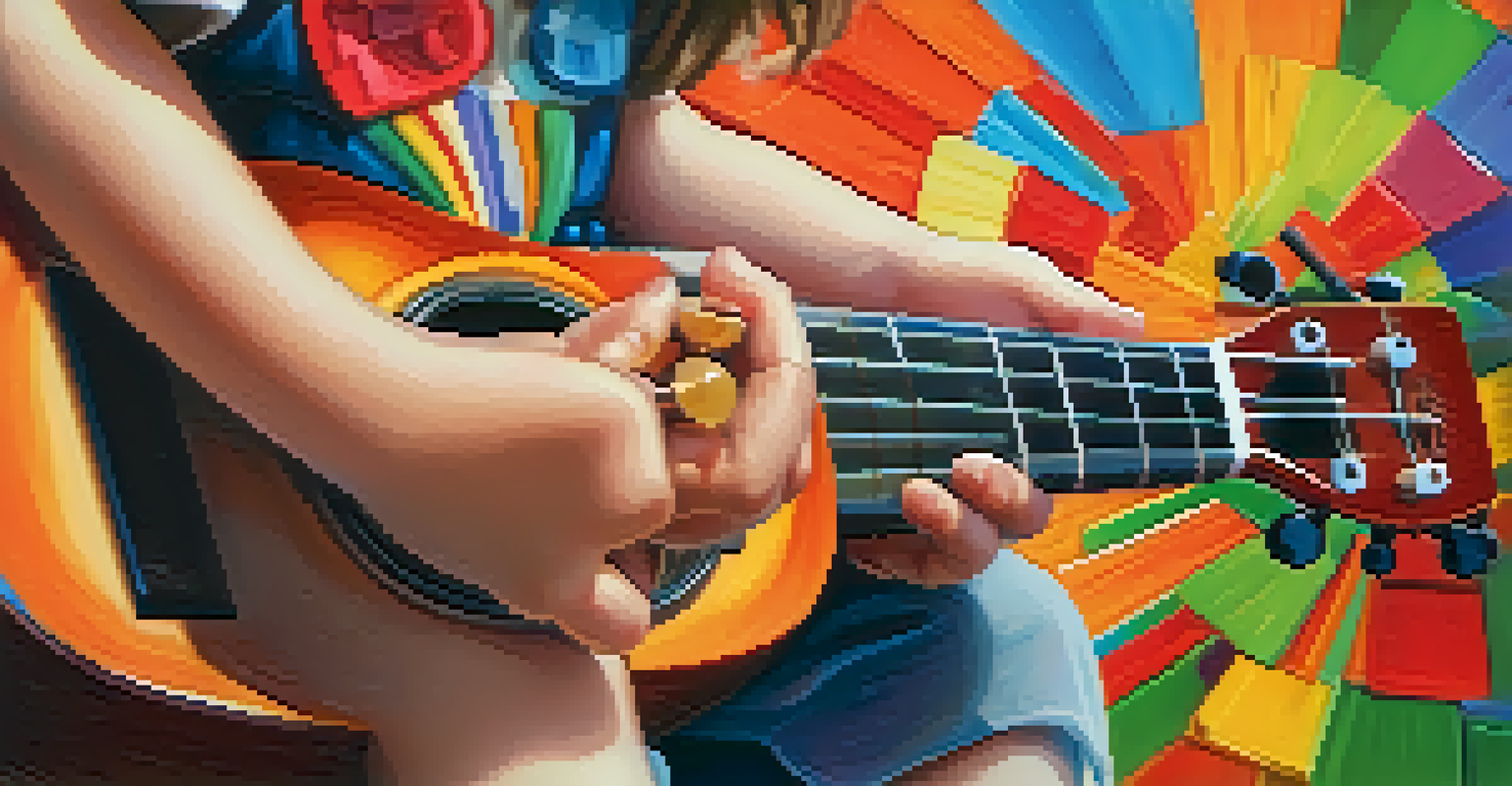Ukulele: A Gateway to Learning Other Instruments in Schools

The Ukulele's Accessibility Encourages Musical Exploration
The ukulele is often considered one of the most approachable instruments for beginners. With its light weight and simple chord structures, students can pick it up and start playing songs within just a few hours. This immediate gratification fosters a love for music and encourages them to explore further.
The ukulele is the perfect instrument for children to start their musical journey.
Unlike larger instruments like the guitar or piano, the ukulele's smaller size makes it ideal for young learners. Its nylon strings are easier on the fingers, reducing frustration and allowing for a more enjoyable learning experience. This accessibility can be the key to unlocking a child's interest in music.
As students gain confidence playing the ukulele, they often express curiosity about other instruments. This natural progression can lead to a broader exploration of music, setting the stage for future learning opportunities and musical growth.
Building Fundamental Skills with the Ukulele
Learning the ukulele helps students develop essential musical skills like rhythm, melody, and harmony. These foundational elements are crucial when transitioning to more complex instruments. For example, understanding how to strum a simple chord on the ukulele can translate easily to picking up a guitar later on.

The ukulele also introduces important concepts such as timing and dynamics. Students learn to listen carefully, adjusting their playing to fit the flow of a song. This heightened awareness is beneficial when they eventually tackle other instruments that require more nuanced control.
Ukulele Sparks Musical Interest
The ukulele's accessibility makes it an ideal starting instrument, encouraging beginners to explore music and other instruments.
Moreover, because the ukulele is commonly used in various musical genres, students gain exposure to diverse styles. This exposure can spark interest in genres they may want to explore further with other instruments, broadening their musical horizons.
Fostering Social Skills Through Group Ukulele Lessons
One of the most enjoyable aspects of learning the ukulele is its social nature. Group lessons and ensemble playing foster collaboration and communication among students. This shared experience not only builds friendships but also nurtures teamwork skills that are invaluable in any group setting.
Music can change the world because it can change people.
Playing music together creates a sense of belonging, encouraging students to support each other in their musical journeys. They learn to listen and respond to one another, skills that are essential in any musical context, including larger band or orchestra settings.
These social interactions often lead to a deeper commitment to music education. As students bond over their shared love for the ukulele, they become more inclined to participate in school music programs, setting the stage for further exploration of various instruments.
Inspiring Creativity and Expression with the Ukulele
The ukulele is a fantastic tool for encouraging creativity in young musicians. Its relatively simple structure allows students to experiment with songwriting and improvisation from an early age. This hands-on engagement with music promotes self-expression and artistic exploration.
For many students, creating their own songs on the ukulele can be a thrilling experience. This process of composing music not only enhances their understanding of musical structure but also boosts their confidence in their creative abilities. It’s a powerful way to connect personally with music.
Fosters Social Skills in Music
Group ukulele lessons promote collaboration and communication, helping students develop essential social skills through shared musical experiences.
As students develop their unique style and sound on the ukulele, they may feel inspired to try their hand at other instruments. The confidence gained through creative expression can serve as a catalyst for further musical exploration, whether it's in a band or as a solo artist.
Enhancing Cognitive Skills Through Ukulele Learning
Research shows that learning an instrument can enhance cognitive abilities such as memory, focus, and problem-solving skills. The ukulele, with its simple yet effective learning curve, provides an excellent platform for honing these skills. Students must memorize chords and practice finger placements, which can improve their overall cognitive function.
Moreover, playing the ukulele requires multitasking, as students must read music while coordinating their hands. This dual focus aids in developing concentration and attention to detail, skills that are transferable to academic subjects.
As students become more adept at playing the ukulele, they often find themselves better equipped to tackle other instruments. The cognitive skills developed through ukulele practice lay a strong foundation for learning more complex instruments like the piano or violin.
Creating a Lifelong Passion for Music
The joy of playing the ukulele often ignites a lifelong passion for music in students. When they experience the thrill of making music, they are more likely to continue their musical journey, whether through formal lessons or self-exploration. This initial spark can lead to a rich and fulfilling relationship with music.
Many musicians credit their early experiences with simple instruments like the ukulele for their enduring love of music. The positive experiences associated with playing can motivate students to pursue music throughout their lives, enriching both their personal and professional endeavors.
Enhances Cognitive Abilities
Learning the ukulele boosts cognitive skills like memory and focus, laying a strong foundation for mastering more complex instruments.
This passion for music can also extend beyond individual learning. As students grow, they often share their love for the ukulele with friends and family, creating a sense of community around music. This shared enthusiasm fosters a culture of creativity and collaboration that benefits everyone involved.
Integrating Ukulele into School Music Programs
Many schools are recognizing the benefits of incorporating the ukulele into their music programs. By introducing this instrument into curricula, educators can engage students in a way that traditional instruments may not. The ukulele's versatility and accessibility make it a natural fit for fostering interest in music education.
Schools can implement ukulele classes or clubs, providing students with opportunities to learn collaboratively. This not only enhances their musical skills but also creates a supportive community of peers who share similar interests. Such environments are conducive to learning and personal growth.

Furthermore, integrating the ukulele into school programs can help bridge the gap for students who may feel intimidated by other instruments. By starting with the ukulele, students can build confidence and gradually transition to more complex instruments, ensuring a comprehensive music education.